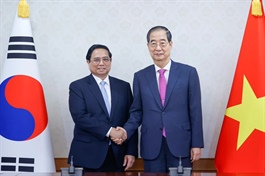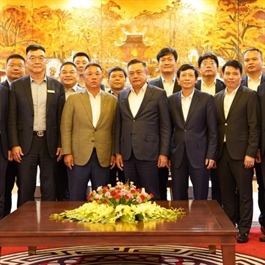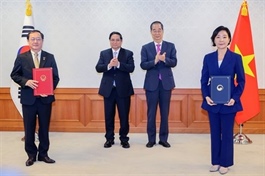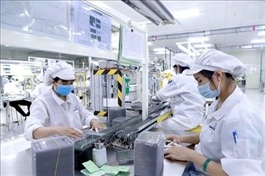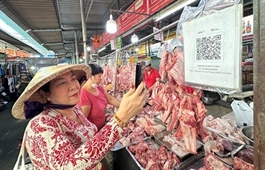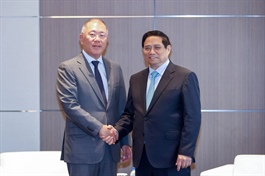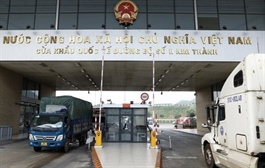Taiwanese investments expand horizons in Vietnam
Taiwanese investments expand horizons in Vietnam
Despite global economic challenges, trade ties and investment cooperation between Vietnam and Taiwan continue to flourish.

Taiwan recognises the potential of the Vietnamese market, as evidenced by a remarkable fourfold increase in investment capital from 2022 to 2023, solidifying its position as a leading foreign investor in Vietnam.
According to the Ministry of Planning and Investment, in 2023, Taiwanese investment capital in Vietnam reached $2.2 billion, a fourfold increase compared to that in 2022. Cumulatively, Taiwan currently ranks fourth among 105 economies investing in Vietnam, with nearly 3,200 projects and a total registered capital exceeding $39.3 billion.
This surge in investment aligns with Taiwan's New Southbound Policy (NSP) deepening collaboration with Southeast Asian nations. Since its introduction in 2016, the NSP has significantly boosted cooperation with Southeast Asia, which has significantly benefited Vietnam, particularly its high-tech electronics sector.
Taiwanese investors have established a strong presence across Vietnam, spanning from the northern provinces to southern metropolis. Taiwanese tech heavyweights such as Foxconn, Wistron, Qisda, and Quanta have made substantial investments in Vietnam.
A survey by Taiwan's Ministry of Economic Affairs shows that 17.7 per cent of Taiwan's traditional manufacturing enterprises and 15.04 per cent of IT and digital enterprises have expressed interest in investing in Vietnam, highlighting its attractiveness as the top destination.
Benefits from free trade agreements
Taiwan’s ever-growing appetite for Vietnam reflects its evolving industrial landscape and Vietnam's emergence as a competitive manufacturing hub in Southeast Asia.
Vietnam offers a stable political administration, skilled workforce, and competitive labour costs, providing a favourable investment environment. In addition, Vietnam engages in multiple free trade agreements (FTAs) with major economies, offering unparalleled business access to global markets.
Many of Vietnam’s FTAs stipulate substantial tariff reductions or waivers on a wide range of trade items, helping Taiwanese businesses to reduce costs being competitive in the global market. For example, under the Korea-Vietnam Free Trade Agreement, 24 tariff lines in the garments and textiles sector have been exempted, enabling Taiwanese textile businesses in Vietnam more competitiveness exporting to Korea.
Furthermore, these agreements have significantly expanded Vietnam's market access, opening doors to global markets for Vietnam made Taiwanese brands. The Comprehensive and Progressive Agreement for Trans-Pacific Partnership, for instance, provides access to markets like Canada, Mexico, and Peru, amassing a market pool of more than 140 million in population and a $13.8 trillion in total GDP.
Moreover, Vietnam's strong commitment to education, technology, and skills development has cultivated a high-quality talent pool, driving innovation and fostering businesses. Coupled with Vietnam’s gravity in the new global manufacturing landscape, the country stands as the top pick for supply chain diversification.
Technology investment wave
Vietnam is actively inviting Taiwanese investments in technology, electronics, semiconductors, science and innovation sectors.
“These are also the realms in which Taiwanese businesses have strengths and are aligned with Vietnam's development policy and strategies to draw in foreign investment,” said Tran Duy Dong, Deputy Minister of Planning and Investment, at the Vietnam-Taiwan (China) Business Forum 2024.
Bloomberg forecasts a bullish economic outlook for Vietnam, projecting a sustainable GDP growth reaching 6 per cent and 6.4 per cent, 2024 and 2025 respectively, with substantial investment growth from Electronics Manufacturing Service and ICT, in addition to traditional manufacturing sectors.
As Vietnam undergoes a pivotal shift from labour-intensive industries to skill/knowledge-intensive sectors, the government offers a suite of preferential policies to draw in more foreign investment, especially in the aforementioned industries. With proper navigations into the benefits, Taiwanese investors can enjoy these policies benefit to maximise incentives and minimise risks.
Gene King, chief investment officer of BW Industrial Development JSC, emphasised the critical importance of understanding the nuances of local business practices, legal frameworks, and investment processes. Local consultants can provide invaluable insights into trade restrictions, regulations, and taxation, while legal experts can offer guidance on incorporation and operation procedures.
According to King, site selection is paramount for establishing manufacturing. Proximity to major transportation gateways, also clusters in convergence of mature infrastructure and reasonable costs make a good start to assure long-term competitiveness.
"Amid the significant shift in supply chain demands, Vietnam's industrial property sector has been growing phenomenally and outperforming other real asset classes in the Asia Pacific region. Leveraging on the unparalleled scale of BW, we can maintain cost efficiency while our seasoned professionals being laser focus on proven development strategies, to execute and deliver projects promptly," he said. "Hence, BW is best positioned to meet with any strict deployment and production schedule from Taiwanese and global manufacturers in Vietnam. To facilitate clients’ Vietnam expansions, also to enhance BW’s portfolio value in capital market."
The promising prospects of Vietnam’s economy are unlocking numerous compelling opportunities for investors. As a leading industrial real estate platform, BW provides tenants with facilities of high reliability and universality, combining with one-stop-shop services–from business licensing and connectivity to machine installation consultations– BW ensures a smooth and swift business setup experience in Vietnam.
BW now accommodates 18 tenants from Taiwan, including Jusda, Sable speaker solutions, FSP Group, and Alltop.



